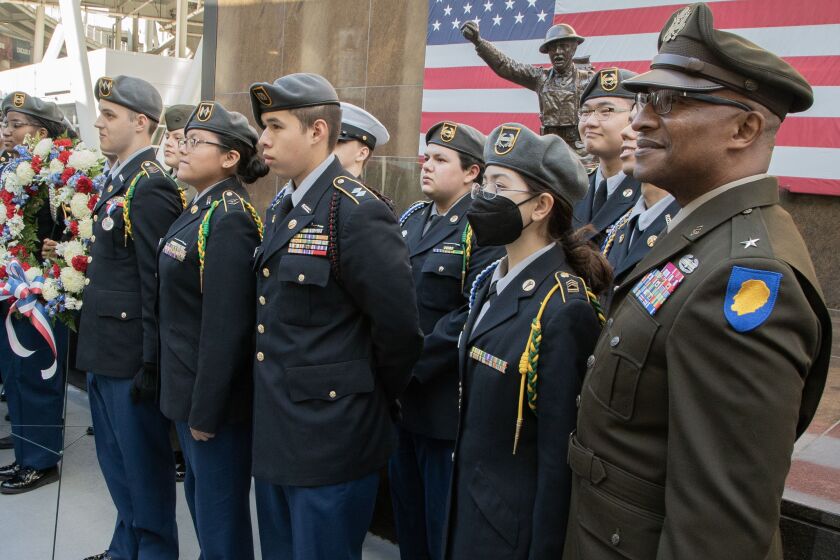 Jan 5, 2023 / Alex Ruppenthal / Chicago Sun Times - Freshman enrollment in a controversial military-run training program plummeted this academic year at some Chicago high schools after district leaders cracked down on schools that were effectively forcing first-year students to participate, according to a report from the district’s watchdog released Thursday.
Jan 5, 2023 / Alex Ruppenthal / Chicago Sun Times - Freshman enrollment in a controversial military-run training program plummeted this academic year at some Chicago high schools after district leaders cracked down on schools that were effectively forcing first-year students to participate, according to a report from the district’s watchdog released Thursday.
Chicago Public Schools pledged last spring to end automatic enrollment in the Junior Reserve Officers’ Training Corps program, a daily class on military science and leadership taught by retired military officers.
The move followed an investigation by the district’s Office of Inspector General, which found that nearly all freshmen at some South and West Side schools were placed in the program “without any choice in the matter,” often as a substitute for gym. Some principals told the OIG they lacked the money to hire enough physical education teachers to offer PE to all students.
The OIG probe was prompted by a Chalkbeat investigation in 2021 that revealed that hundreds of students at 10 predominantly Black and Latino high schools were being enrolled in JROTC by default. The practice drew backlash from some parents who described it as a way of shepherding teens from under-resourced schools toward military careers and away from other opportunities.
In its annual report, the OIG found freshman enrollment in JROTC had decreased “dramatically” at eight schools where automatic freshman enrollment was most widespread. Enrollment fell from 639 to 211 between the 2020-21 school year and the current school year.
One principal said this is the first year in which freshmen can decide between physical education or JROTC.
The National Network Opposing the Militarization of Youth (NNOMY)

JROTC stands for Junior Reserve Officers' Training Corps, a program that is designed to provide high school students with leadership skills and prepare them for a possible future career in the military. While some people support JROTC, others are opposed to it for various reasons.
One of the primary reasons why people oppose JROTC is because they believe that it glorifies war and violence. They argue that the program encourages young people to view military service as the only viable career option, rather than pursuing other paths such as higher education or vocational training.
Others object to JROTC because they believe that it promotes militarism and nationalism. They argue that the program instills a sense of blind patriotism in young people, rather than fostering critical thinking skills and independent thought.
Some critics of JROTC also argue that the program is discriminatory, particularly against students who are LGBTQ or who hold pacifist beliefs. They point to instances where JROTC instructors have made homophobic or sexist remarks or where students have been punished for refusing to participate in certain activities.
Finally, opponents of JROTC argue that the program diverts funding and resources away from other important areas of education. They point to instances where schools have cut funding for music, art, or language programs in order to make room for JROTC.
Overall, opposition to JROTC is rooted in concerns about militarism, nationalism, discrimination, and the allocation of resources within the education system.
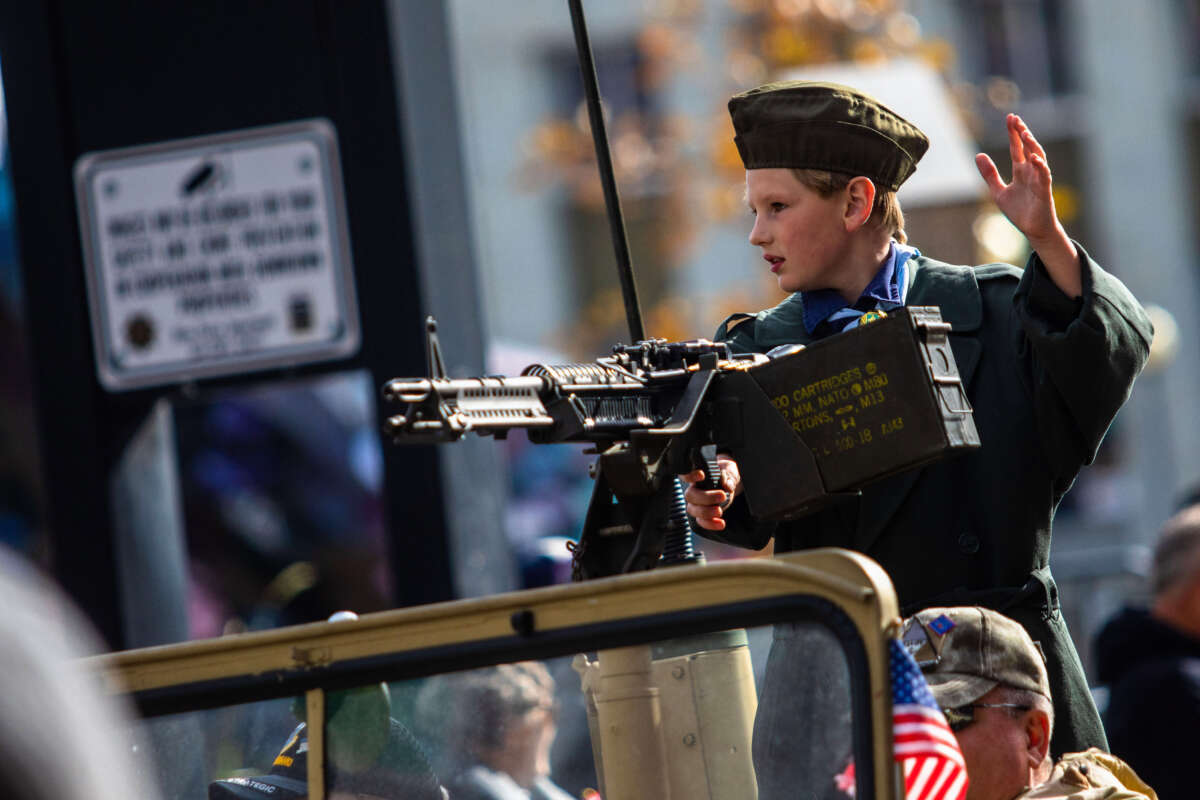 February 23, 2023 / Andrea Mazzarino / Truthout - During a Veterans Day celebration in my small Maryland community, a teacher clicked through a slideshow of smiling men and women in military uniforms. “Girls and boys, can anyone tell me what courage is?” she asked the crowd, mostly children from local elementary schools, including my two young kids.
February 23, 2023 / Andrea Mazzarino / Truthout - During a Veterans Day celebration in my small Maryland community, a teacher clicked through a slideshow of smiling men and women in military uniforms. “Girls and boys, can anyone tell me what courage is?” she asked the crowd, mostly children from local elementary schools, including my two young kids.
A boy raised his hand. “Not being scared?” he asked.
The teacher seized on his response: “Yes!” she exclaimed. “Not being scared.” She proceeded to discuss this country’s armed forces, highlighting how brave U.S. troops are because they fight to defend our way of life. Service-members and veterans in the crowd were encouraged to stand. My own children beamed, knowing that their father is just such a military officer. The veterans and troops present did indeed stand, but most of them stared at the ground. As a counselor who works with children, including those from local military families, I marveled that the teacher was asking the young audience to dismiss one of the most vulnerable emotions there is — fear — in the service of armed violence.
No mention was made of what war can do to those fighting it, not to speak of civilians caught in the crossfire, and how much money has left our country’s shores thanks to armed conflict. That’s especially true, given the scores of U.S.-led military operations still playing out globally as the Pentagon arms and trains local troops, runs intelligence operations, and conducts military exercises.
That week, my children and others in schools across the county spent hours in their classrooms celebrating Veterans Day through a range of activities meant to honor our armed forces. My kindergartener typically made a paper crown, with six colorful peaks for the six branches of service, that framed her little face. Kids in older grades wrote letters to soldiers thanking them for their service.
I have no doubt that if such schoolchildren were ever shown photos in class of what war actually does to kids their age, including of dead and wounded elementary school students and their parents and grandparents in Afghanistan and Iraq, there would be an uproar. And there would be another, of course, if they were told that “their” troops were more likely to be attacked (as in sexually assaulted) by one of their compatriots than by any imaginable enemy. I live in Montgomery County, Maryland, one of the most progressive and highly educated counties in the country and even here, war, American-style, is painted as a sanitized event full of muscular young people, their emotions under control (until, of course, they aren’t).
Even here, few parents and teachers dare talk to young children about the atrocities committed by our military in our wars from Vietnam to Afghanistan.
The War on Terror and the Battle for Young Minds
 February 23, 2023 / Andrea Mazzarino / Tomdispatch - During a Veterans Day celebration in my small Maryland community, a teacher clicked through a slideshow of smiling men and women in military uniforms. “Girls and boys, can anyone tell me what courage is?” she asked the crowd, mostly children from local elementary schools, including my two young kids.
February 23, 2023 / Andrea Mazzarino / Tomdispatch - During a Veterans Day celebration in my small Maryland community, a teacher clicked through a slideshow of smiling men and women in military uniforms. “Girls and boys, can anyone tell me what courage is?” she asked the crowd, mostly children from local elementary schools, including my two young kids.
A boy raised his hand. “Not being scared?” he asked.
The teacher seized on his response: “Yes!” she exclaimed. “Not being scared.” She proceeded to discuss this country’s armed forces, highlighting how brave U.S. troops are because they fight to defend our way of life. Servicemembers and veterans in the crowd were encouraged to stand. My own children beamed, knowing that their father is just such a military officer. The veterans and troops present did indeed stand, but most of them stared at the ground. As a counselor who works with children, including those from local military families, I marveled that the teacher was asking the young audience to dismiss one of the most vulnerable emotions there is — fear — in the service of armed violence.
No mention was made of what war can do to those fighting it, not to speak of civilians caught in the crossfire, and how much money has left our country’s shores thanks to armed conflict. That’s especially true, given the scores of U.S.-led military operations still playing out globally as the Pentagon arms and trains local troops, runs intelligence operations, and conducts military exercises.
That week, my children and others in schools across the county spent hours in their classrooms celebrating Veterans Day through a range of activities meant to honor our armed forces. My kindergartener typically made a paper crown, with six colorful peaks for the six branches of service, that framed her little face. Kids in older grades wrote letters to soldiers thanking them for their service.
A recent string of revelations about abuses by the Junior Reserve Officers’ Training Corps presents an opportunity to rein in the military’s presence and power in public schools.
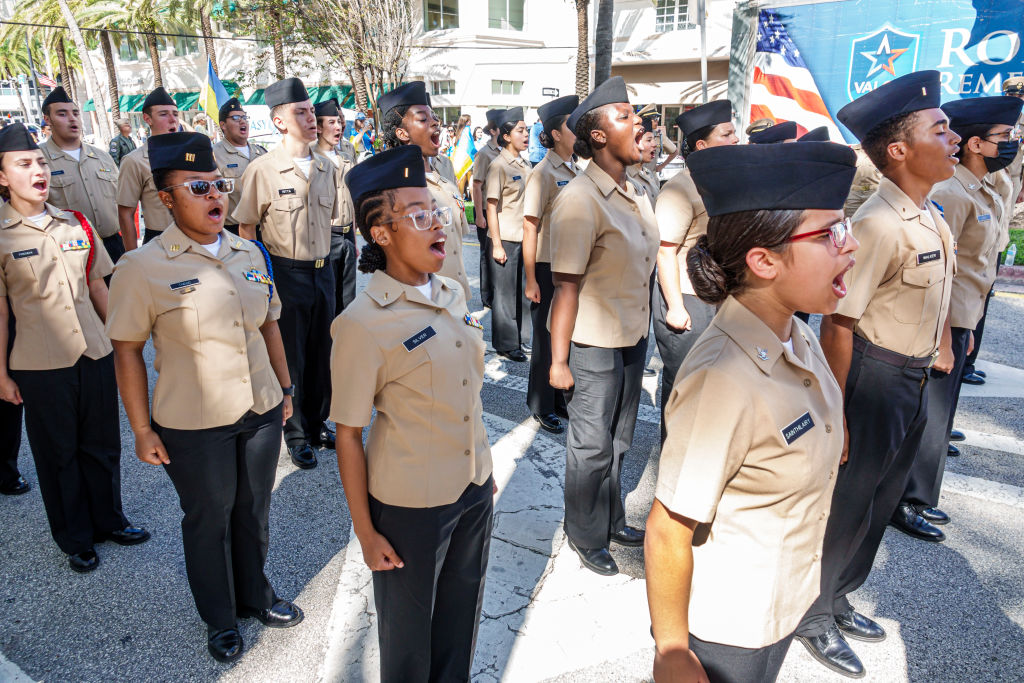 01.08.2023 / Seth Kershner Scott Harding / Jacobin - The Pentagon’s signature program for instilling military values in American schools, the Junior Reserve Officers’ Training Corps (JROTC), has a long history dating to 1916. But it hasn’t endured such bad press since the 1970s. In several damning articles, the New York Times revealed the structure of what’s wrong with high school military training: instructors who use their positions to prey on teenage girls, in-school shooting ranges built with grants from the National Rifle Association, and mandatory enrollment in some of the nation’s largest school districts — all abetted by school officials who fail to adequately monitor a program of such dubious educational value that many instructors lack a college degree.
01.08.2023 / Seth Kershner Scott Harding / Jacobin - The Pentagon’s signature program for instilling military values in American schools, the Junior Reserve Officers’ Training Corps (JROTC), has a long history dating to 1916. But it hasn’t endured such bad press since the 1970s. In several damning articles, the New York Times revealed the structure of what’s wrong with high school military training: instructors who use their positions to prey on teenage girls, in-school shooting ranges built with grants from the National Rifle Association, and mandatory enrollment in some of the nation’s largest school districts — all abetted by school officials who fail to adequately monitor a program of such dubious educational value that many instructors lack a college degree.
These revelations have vindicated those in the “counter-recruitment” movement who for years warned of a largely unsupervised program taught by retired military officers. It also raises serious questions about why military training programs have any place in US public high schools.
The Pentagon spends around $400 million annually to provide training in military drill and “leadership” through the JROTC in more than 3,500 high schools, to approximately five hundred thousand students. Despite this presence, the program seems to operate on the fringes, with school officials exercising scant oversight even as instructors take their young “cadets” on extended travel to military bases and interschool competitions. Such conditions foster an environment rife with potential abuse.
The Times identified at least thirty-three JROTC instructors who had been criminally charged with sexual misconduct with their students, and found evidence that numerous other instructors were accused but never charged. According to the education outlet Chalkbeat, Chicago’s head of school military instruction quietly resigned last summer, three years after failing to inform officials of suspected sexual abuse by a JROTC instructor who was later arrested.
In high schools across the country, students are being placed in military classes without electing them on their own. “The only word I can think of is ‘indoctrination,’” one parent said.
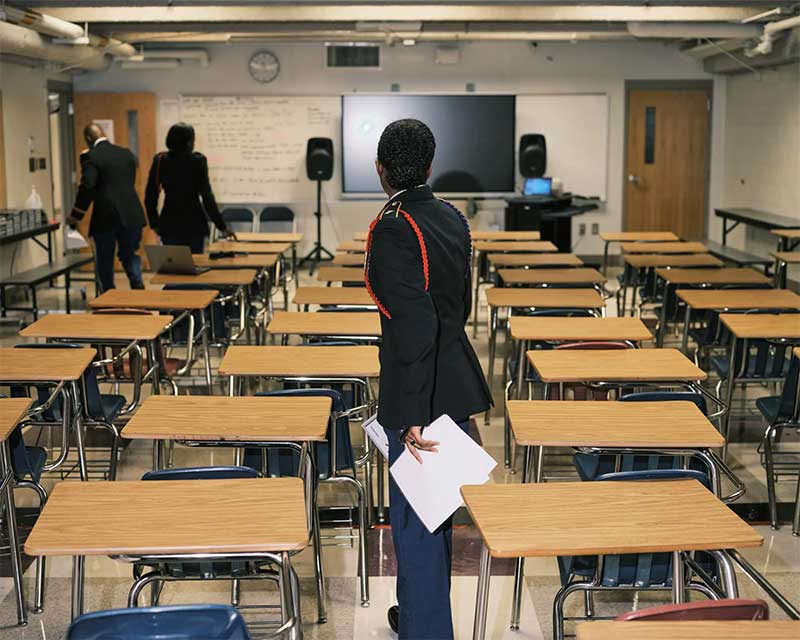
Dec. 11, 2022Updated Dec. 20, 2022 / Mike Baker, Nicholas Bogel-Burroughs, Ilana Marcus / New York Times - DETROIT — On her first day of high school, Andreya Thomas looked over her schedule and found that she was enrolled in a class with an unfamiliar name: J.R.O.T.C.
She and other freshmen at Pershing High School in Detroit soon learned that they had been placed into the Junior Reserve Officers’ Training Corps, a program funded by the U.S. military designed to teach leadership skills, discipline and civic values — and open students’ eyes to the idea of a military career. In the class, students had to wear military uniforms and obey orders from an instructor who was often yelling, Ms. Thomas said, but when several of them pleaded to be allowed to drop the class, school administrators refused.
“They told us it was mandatory,” Ms. Thomas said.
J.R.O.T.C. programs, taught by military veterans at some 3,500 high schools across the country, are supposed to be elective, and the Pentagon has said that requiring students to take them goes against its guidelines. But The New York Times found that thousands of public school students were being funneled into the classes without ever having chosen them, either as an explicit requirement or by being automatically enrolled.
A review of J.R.O.T.C. enrollment data collected from more than 200 public records requests showed that dozens of schools have made the program mandatory or steered more than 75 percent of students in a single grade into the classes, including schools in Detroit, Los Angeles, Philadelphia, Oklahoma City and Mobile, Ala. A vast majority of the schools with those high enrollment numbers were attended by a large proportion of nonwhite students and those from low-income households, The Times found.
Instructors in military-sponsored J.R.O.T.C. classes have offered to promote the N.R.A. in high schools in exchange for money for their marksmanship programs.
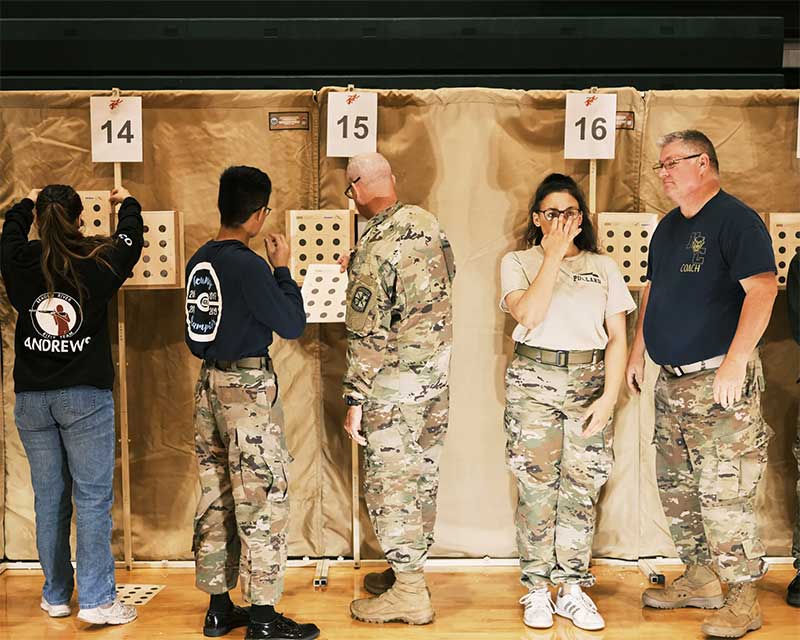
Dec. 20, 2022 / Nicholas Bogel-Burroughs and / New York Times - CAPE CORAL, Fla. — Beneath the fluorescent lights of a high school gym, dozens of teenagers took turns firing air rifles at a series of bull's-eye targets, part of a marksmanship competition that drew students from schools all along the Florida Gulf Coast.
The event was better outfitted than many high school competitions, with lights that illuminated the targets, scopes for spotting downrange and a heavy curtain to keep pellets from going astray, thanks to the help of a key sponsor: the charitable arm of the National Rifle Association.
“A lot of the equipment that you see behind me comes from N.R.A. grants,” Bryan Williams, a retired Army major who teaches in the Junior Reserve Officers’ Training Corps program at Mariner High School in Cape Coral, told the contestants.
That tip of the hat was no casual remark. In order to win N.R.A. sponsorships, records show, military instructors who lead J.R.O.T.C. marksmanship teams at public high schools have repeatedly promised to promote the organization at competitions and in newsletters, post N.R.A. banners at their schools or add the N.R.A. logo to apparel worn by students.
In his pitch, Mr. Williams also offered to provide student testimonials to the organization “to include supporting photographs and storyboards showcasing the equipment and the happy cadets.”
Subscribe to NNOMY Newsletter
NNOMYnews reports on the growing intrusions by the Department of Defense into our public schools in a campaign to normalize perpetual wars with our youth and to promote the recruitment efforts of the Pentagon.
Search Articles
Language
FAIR USE NOTICE
This site contains copyrighted material the use of which has not always been specifically authorized by the copyright owner. We are making such material available in our efforts to advance understanding of issues connected with militarism and resistance. We believe this constitutes a ‘fair use’ of any such copyrighted material as provided for in section 107 of the US Copyright Law. In accordance with Title 17 U.S.C. Section 107, the material on this site is distributed without profit to those who have expressed a prior interest in receiving the included information for research and educational purposes. For more information go to: https://www.law.cornell.edu/uscode/17/107.shtml. If you wish to use copyrighted material from this site for purposes of your own that go beyond ‘fair use’, you must obtain permission from the copyright owner.
Donate to NNOMY
Your donation to NNOMY works to balance the military's message in our public schools. Our national network of activists go into schools and inform youth considering military service the risks about military service that recruiters leave out.
